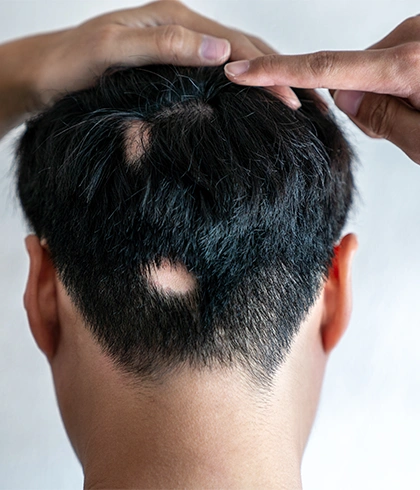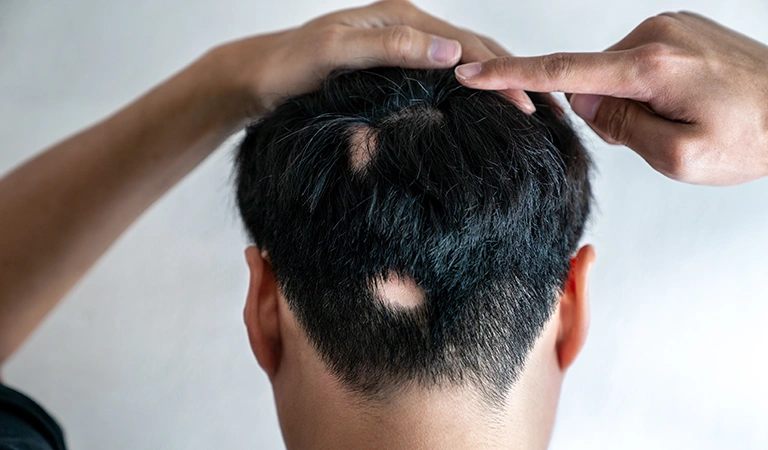

Natural Home Remedies for Alopecia Areata
Have you been noticing a receding hairline or bald patches on your scalp? Hair loss, especially conditions like alopecia areata, can come without warning and leave you concerned. Alopecia areata affects about 2% of the global population at some point in their lives, making it a reasonably common issue.
But before rushing to chemical treatments, are there natural remedies for alopecia areata that can help? In this blog, we will explore simple, effective home remedies that people have tried to manage Alopecia Areata, along with insights on how homeopathic treatments can support your hair health. These everyday methods might slow down hair loss and help you feel more in control of your hair health. Let’s take a look at how you can support your hair naturally!
What is Alopecia Areata?
It is a medical condition that induces hair loss, often in small, round patches on the scalp. Alopecia Areatea is an autoimmune disorder where the immune system of the body mistakenly attacks the hair follicles, leading to hair shedding. This condition can impact anyone, regardless of age or gender, although it often appears during childhood or teenage years. In severe cases, it may extend to complete scalp hair loss (Alopecia Totalis) or body hair loss (Alopecia Universalis).
Read more: Alopecia Areata Causes that Affect Men and Women
Alopecia areata is generally unpredictable. Some people may experience spontaneous regrowth, while others may have recurring episodes of hair loss. This condition's impact is not just physical; it can also affect one's confidence and emotional well-being.
Common Symptoms of Alopecia
Alopecia Areata presents itself through several distinctive signs. The most common symptom is hair loss, but there are other indicators as well:
- Patchy hair loss: Hair falls out in small, round patches on the scalp or other parts of the body. These patches are often smooth and free from inflammation.
- Sudden hair loss: Hair loss occurs suddenly and without any prior warning. You may notice clumps of hair on your pillow, comb, or in the shower.
- Nail changes: Some people with alopecia also experience pitting, ridging, or brittleness in their fingernails and toenails.
- Itching or tingling: In some cases, the skin may feel itchy or slightly painful before the hair falls out.
- Thinning or breakage: Even without full patches of hair loss, thinning or weakened hair can be a sign of alopecia.
- White or Grey Hair in Affected Areas: In some cases, hair regrowing in areas affected by alopecia may initially appear white or grey.
- Scalp Sensitivity: Increased sensitivity in the scalp area where hair loss occurs, which may feel tender to the touch.
- Skin changes: Redness or scaling may occur around the hair loss patches.
Each of these signs can vary in intensity. If you’re experiencing these signs, consider trying effective home remedies for alopecia areata.
Causes of Alopecia
While the exact reason for alopecia areata is still unclear, it is generally considered an autoimmune condition. A combination of genetical, environmental, and psychological factors may trigger this disorder.
Common causes of alopecia areata include genetics, where a family history of autoimmune disorders increases risk, and autoimmune response, where the body mistakenly attacks hair follicles. Additional causes include high stress, hormonal imbalances, infections, allergies, and certain medications that may contribute to hair loss.
Read more: What Factors Can Cause Alopecia Areata?
Home Remedies for Alopecia Areata
Many people dealing with alopecia areata turn to natural treatments in an attempt to manage the condition and encourage hair regrowth. While these remedies may not work for everyone, some individuals have found them beneficial. Here are some home remedies for alopecia areata that you can try:
Aromatherapy and Scalp Massage
When combined with scalp massage, aromatherapy can be a soothing and beneficial approach to promote hair growth. This method leverages the therapeutic properties of essential oils to enhance relaxation and stimulate the scalp.
Essential oils that can be beneficial include:
- Lavender Oil: This is known for its calming effects, lavender oil may stimulate hair follicles and has antimicrobial properties that help maintain scalp health.
- Rosemary Oil: Often used to improve blood circulation, rosemary oil can help prevent further hair loss by encouraging new hair growth.
- Peppermint Oil: The cooling sensation of peppermint oil may improve blood flow to the scalp, potentially enhancing hair thickness and promoting growth.
For practical use, follow these steps:
Mix a few drops of your chosen essential oil with a carrier oil (like coconut or jojoba oil) to effectively incorporate aromatherapy into your routine.
- Gently massage this blend into your scalp for a few minutes, promoting absorption and relaxation.
- Leave it on for a few minutes more before washing your hair. For optimal results, repeat this thrice a week.
Dietary Changes
What you eat plays a big role in your overall health, including the health of your hair. Incorporating a nutrient-rich diet that supports hair health can make a difference in managing alopecia areata.
Essential nutrients that can support hair health include:
- Proteins: Since hair is primarily made of keratin, incorporating protein-rich foods like eggs, fish, beans, and lentils is vital for hair structure.
- Vitamins: Certain vitamins are vital for maintaining healthy hair.
- Vitamin D: Low levels may contribute to hair loss, so include fortified foods, and fatty fish, and ensure some sunlight exposure for alopecia treatment at home.
- Vitamin E: This antioxidant improves blood circulation to the scalp, benefiting hair follicles. Sources include nuts, seeds, and leafy greens.
- Minerals: Important minerals support hair growth and health.
- Zinc: It is essential for hair tissue growth and repair and is found in nuts, whole grains, and dairy products.
- Iron: Necessary for oxygen transport in the body, with sources including red meat, lentils, and spinach.
- Biotin: Biotin (vitamin B7) supports hair health. Eggs, seeds, nuts, and sweet potatoes are rich sources.
- Omega-3 fatty acids: Omega-3s in fish like salmon, walnuts, and flaxseeds can help lower inflammation and support scalp health.
- Hydration: Staying well-hydrated is needed for overall health and helps maintain moisture in the scalp.
Stress Management
Since stress can initiate or worsen alopecia areata, it’s crucial to practice effective stress management. Utilising various techniques can enhance both mental well-being and hair health.
- Yoga and Meditation: Practicing yoga promotes relaxation and improves blood circulation, while mindfulness meditation can significantly reduce stress levels.
- Regular Exercise: Engaging in physical activities like walking, running, or dancing boosts endorphins, the body’s natural mood lifters, helping to manage stress.
- Adequate Sleep: Quality sleep is important for recovery and rejuvenation. Aim for 7-9 hours of restful sleep each night.
- Support Networks: Connecting with friends, family, or support groups can provide emotional relief. Sharing experiences and feelings can be therapeutic.
In addition to these traditional remedies, Dr Batra’s® New Hair treatment offers a modern approach worth considering. This bio-engineered, FDA-approved, non-invasive therapy uses plant plasma rich in polypeptides. Without surgery, it reinforces hair follicles and addresses various hair conditions, including Alopecia Areata.
This innovative treatment effectively complements homeopathic remedies. Combining these approaches, you tackle the physical aspects of hair loss and promote overall well-being. If you're seeking a holistic way to manage your hair health, exploring home remedies and advanced treatments like New Hair can be beneficial.
Home Remedies to Avoid for Alopecia
While many alopecia areata home remedies are safe and effective, some may do more harm than good, particularly regarding scalp and hair care. Here are a few remedies to avoid:
- Harsh chemicals: Avoid applying strong chemicals like onion juice or garlic directly to your scalp. They can cause irritation, burning, and further hair damage, especially if you have sensitive skin.
- Overuse of heat styling tools: Using flat irons, blow dryers, or curling irons excessively can damage the hair and worsen hair loss. If you do use them, make sure to apply a heat protectant first.
- Excessive oiling: Oiling your hair is beneficial, but over-oiling can clog the scalp and cause dandruff, which might worsen the condition.
- Unverified Supplements: Be cautious with unregulated supplements that promote hair growth without scientific backing.
- Using non-prescribed medication or creams: Always be cautious when using over-the-counter hair loss creams or medicines without a doctor’s recommendation. Misuse can cause adverse side effects.
Final Thoughts
Alopecia Areata can be a distressing condition, but by making simple lifestyle changes and trying out natural home remedies, you may notice improvements in your hair health. These remedies are generally safe, easy to try at home, and may offer some benefits in managing hair loss. Remember that alopecia areata self-care may require patience, and combining treatments may yield better results.
If your condition persists or worsens, seeking professional advice is important. Homeopathy has shown promise in treating autoimmune conditions like alopecia areata by addressing the root cause. At Dr Batra’s® Homeopathic Clinics in UAE, we offer personalised alopecia treatment plans to help manage hair loss. Get in touch with our experts for a detailed consultation and explore the best treatment options for your needs.
FAQs
What is the most effective natural remedy for alopecia?
There’s no one-size-fits-all remedy, but scalp massages with essential oils and a nutrient-rich diet are often helpful home treatments for alopecia. Homeopathy also plays a key role by addressing the underlying causes of alopecia areata, making it a valuable addition to your hair care routine.
Can diet alone prevent hair loss?
While a healthy diet is paramount for maintaining hair health, diet alone may not prevent alopecia areata, as it is an autoimmune disorder. However, eating nutrient-dense foods rich in vitamins, minerals, and antioxidants can help support overall hair health and may slow down the rate of hair loss.
How long does it take to see results from natural remedies?
The time it takes to see results varies from person to person. Some may notice improvements within a few weeks of consistent use, while others may take several months. Patience and consistency are fundamental when using natural remedies.
Are there any side effects of using natural remedies for alopecia?
Most natural remedies for alopecia areata, such as essential oils, scalp massage, and dietary changes, are safe when used properly. However, certain individuals may experience allergic reactions or scalp irritation. Always perform a patch test before applying new oils or products to your scalp.
Can stress cause hair loss?
Yes, stress is one of the major causes of alopecia areata. High-stress levels can guide to hair thinning and loss directly or by triggering an autoimmune response. Managing stress through relaxation techniques, yoga, and adequate sleep is essential for alopecia areata self-care and can help control hair loss associated with this condition.




